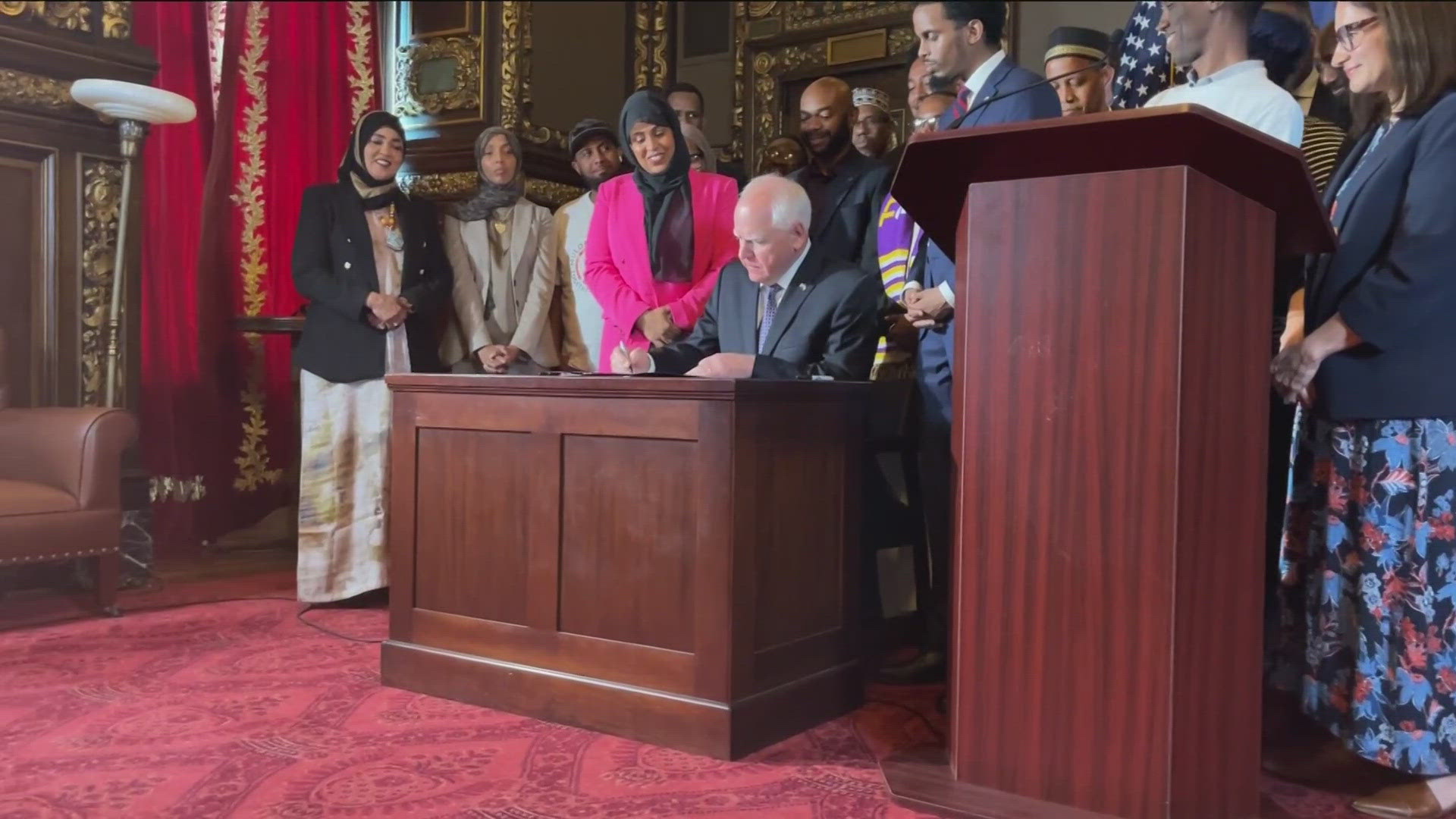ST PAUL, Minn. — Gov. Tim Walz Tuesday signed a bill that sets minimum wages for rideshare drives across Minnesota and puts to rest the specter of Uber and Lyft leaving the state.
The rideshare pay bill, passed on the final day of the 2024 Session, was the result of a compromise between lawmakers, drivers, rideshare companies, and members of the Minneapolis City Council. At the State Capitol ceremony, Walz was surrounded by lawmakers and drivers who came to celebrate the moment.
"When we started this fight two years ago, we knew it was going to be a hard fight," Rep. Hodan Hassan of Minneapolis remarked.
"We knew it was going to be a lot of challenge because it was everyday average Minnesotans fighting corporate America, and that fight was, we knew it would be hard. We just didn’t know how hard it was going to be."
Beginning January 1, 2025, drivers will be guaranteed at least $1.28 cents per mile plus 31 cents per minute while carrying passengers, with a minimum payment of $5.00. The legislation also includes other protections that were recommended by a task force appointed by the governor after he vetoed a different version of the bill last year.
"It has pay transparency, has minimum compensation, has an insurance section, and also has protections related to deactivation," Labor and Industry Commissioner Nicole Blissenbach told reporters at the signing ceremony.
"That deactivation has protections moving forward, but it also has some process and protections for some people who’d been previously deactivated."
A comprehensive study of transportation network drivers by the Dept. of Labor and Industry last year determined that most rideshare drivers are persons of color, and more than half of them are immigrants. That study recommended 89 cents per mile and 49 cents per minute would be roughly equivalent to the state minimum wage plus some of the driver's work-related expenses.
These rates compare with the Minneapolis ordinance that was rescinded last week, which would've guaranteed drivers $1.41 per mile plus 51 cents per minute and other benefits. Uber and Lyft had both issued warnings that they would leave Minneapolis if that ordinance went into effect as scheduled in July.
Even the lower amounts coming from the new statewide law will drive fares upward, according to the companies. But Walz said a balance needed to be struck.
"I think a lot of people don’t want to take a ride knowing that the person that’s driving them can’t afford to pay their bills, or their children can’t eat," Walz told reporters. "That’s not what people want to do. They want fairness in this."
Republican opponents to the legislation asserted that it's not the state's role to come between independent contractors and private companies that put them under contract. They argued the transportation network companies were built on the idea of drivers providing rides as side gigs, rather than relying on them as full-time employment.
But Eid Ali, the head of the Minnesota Uber and Lyft Drivers Association said many drivers don't think of it as merely a side hustle.
"Maybe for some people, it’s a gig work, but the community I’m a member of depends on this as their livelihood, and it’s like a 100 percent full-time job for them," Ali said.
"So, it’s not a gig. It’s a full-time job. So that’s why we need to make sure that these drivers that are putting 12, 14 hours of time make enough so they can afford their families."
Some, including Minneapolis City Council Member Linea Palmisano, have said the time lawmakers spent out of pocket negotiating the rideshare deal deprived legislators of the time they could've spent negotiating a public works construction bonding bill. The lead author of the bill in the Senate, Sen. Omar Fateh, was unavailable to provide the 34th vote on other bills while in talks on the rideshare bill.
But Walz and DFL leaders say it had become clear to them by the final week of session that Republican leaders were not going to agree to support a bonding bill unless Democrats made major concessions on high-priority policy issues such as the Equal Rights Amendment and the straw purchasers bill.
Democrats have ruled out the possibility of a special session for the very same reasons.

